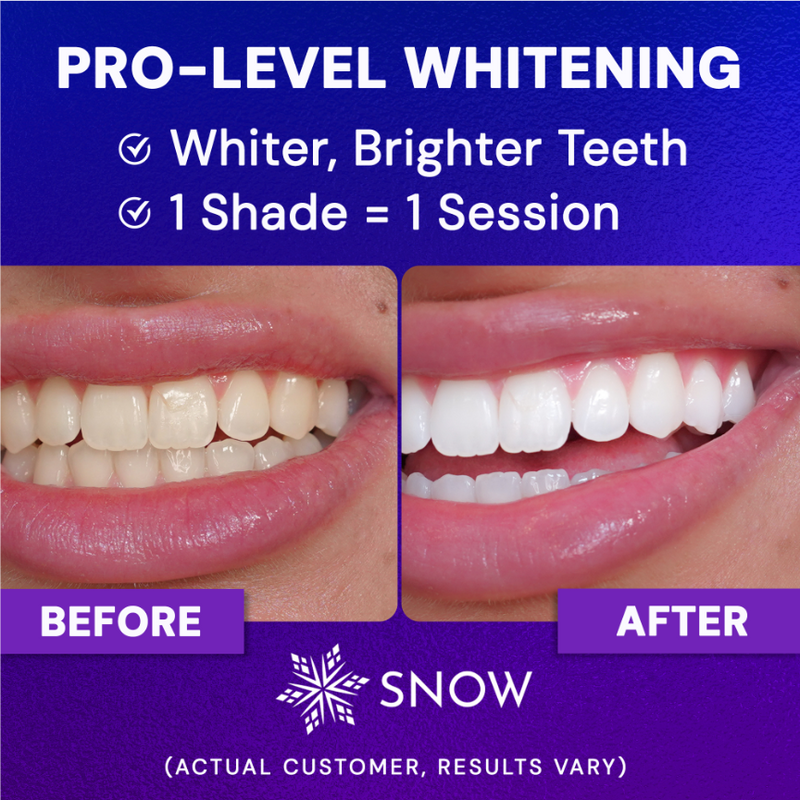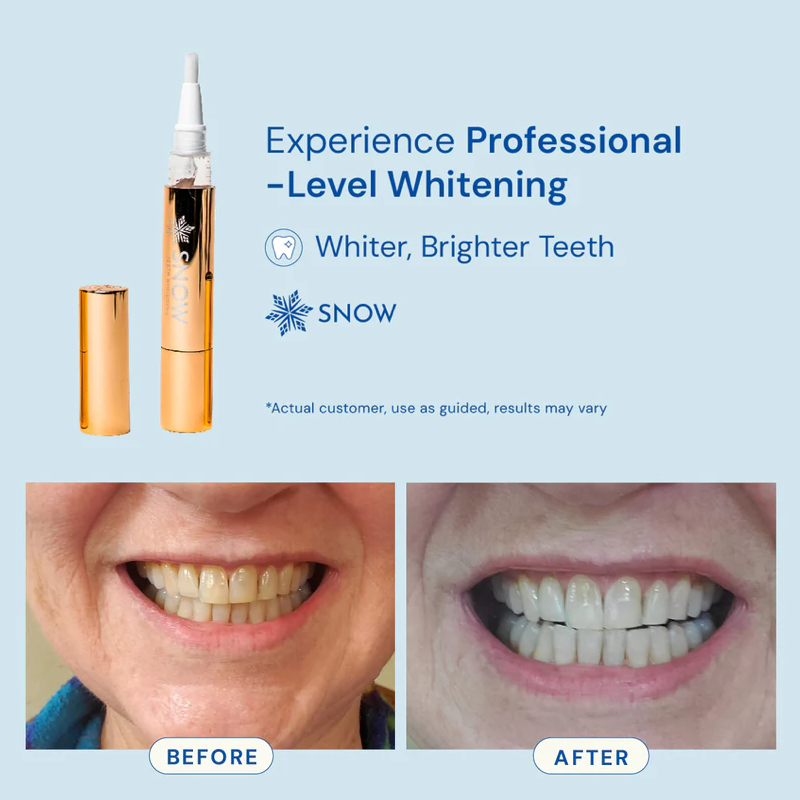The foul, poop-like smell on dental floss is typically caused by trapped food particles, bacterial plaque, and the presence of volatile sulfur compounds (VSCs) released when this debris decays between teeth.
This odor is a key sign that you need to improve your oral hygiene or seek professional treatment for an issue like gum disease or a hidden cavity. This guide will detail the main causes of floss odor, the proper techniques to prevent it, and the signs that signal a necessary dental visit.
Key Takeaways
-
A poop-like smell on floss is often caused by trapped food particles, bacterial buildup, gum disease, tooth decay, or dry mouth, all of which indicate underlying oral health issues.
-
Regular flossing and proper oral hygiene are essential for preventing bad breath, reducing plaque buildup, and promptly addressing issues like gum disease and cavities.
-
If persistent bad breath and unpleasant odors occur despite good oral hygiene, it may be necessary to consult a dentist to evaluate for potential underlying health problems.
What Are the Main Causes of Foul Odor on Dental Floss?
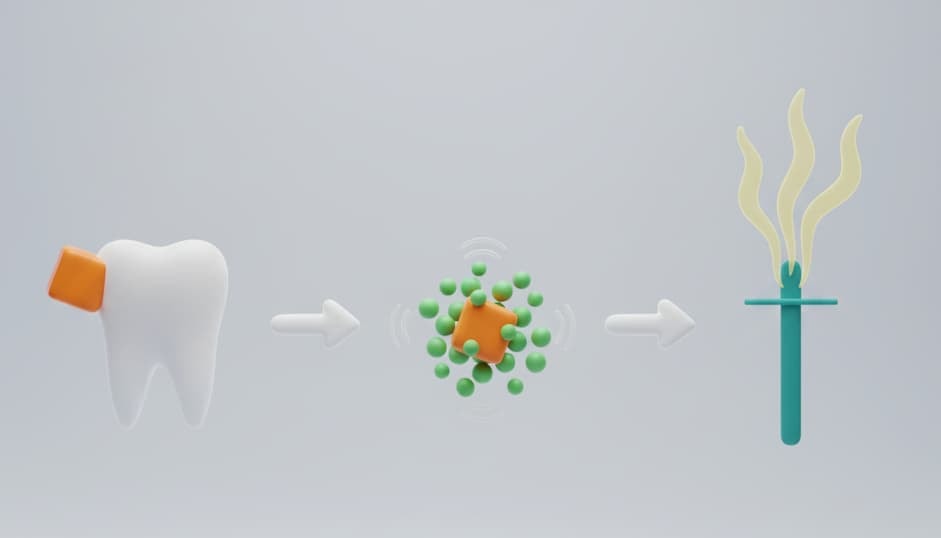
One of the most common reasons for foul odor on floss is the presence of trapped food particles between the teeth, particularly high-protein foods like meat and dairy.
When food debris remains wedged in the tight spaces between teeth, the natural bacteria in the mouth begin to digest and ferment it. This process of decay is accelerated in hard-to-reach areas where saliva flow and cleaning action are limited, creating a perfect environment for putrefaction.
These leftover meals hide where toothbrushes can't reach, and the process of flossing physically dislodges this decaying debris, transferring the concentrated, foul odor directly onto the floss.
The foul odor is directly caused by the release of Volatile Sulfur Compounds (VSCs), such as hydrogen sulfide and methyl mercaptan, as the debris decays.
Anaerobic bacteria, which thrive in low-oxygen environments below the gum line and between teeth, are the primary producers of VSCs. These compounds are foul-smelling gases that are also found in feces and rotten eggs, leading to the "poop-like" or rotten smell on the floss.
The odor is a powerful warning signal indicating a significant concentration of unmanaged bacterial waste and decaying food material in a specific area of the mouth.
Let’s break down the top 10 causes and how they affect your smile during treatment.
1. Trapped Food Particles Decaying Between Teeth
One of the most common reasons for foul odor on floss is trapped food particles between the teeth. Saliva plays a crucial role in oral health by washing away food debris, neutralizing cavity-causing acids, and preventing the overgrowth of harmful, odor-producing bacteria.
Why it happens:
-
Tight spaces between teeth can catch tiny food particles
-
These decaying food particles rot over time, especially high-protein foods
-
Anaerobic bacteria feed on this debris and release sulfur compounds
-
The odor clings to your dental floss when you dislodge the trapped food
Neglecting these trapped food particles allows them to rot and become a feeding ground for odor-causing bacteria. This is why floss that smells bad often points to leftover meals hiding where brushes can't reach.
2. Bacterial Plaque and Tartar Buildup
Plaque, a soft and sticky biofilm, is a primary odor source because it is a constantly forming matrix of bacteria, saliva, and food particles.
When plaque is not adequately removed by flossing, it can harden into a rougher deposit called tartar (calculus), especially below the gum line. Tartar acts as a microscopic sponge, creating a porous, protected structure that traps volatile sulfur compound-producing bacteria and makes them immune to regular brushing.
This buildup ensures a persistent, protected source of odor-causing bacteria that is only disturbed and picked up when the floss attempts to pass through the heavily calcified deposit.
3. Gingivitis and Advanced Gum Disease
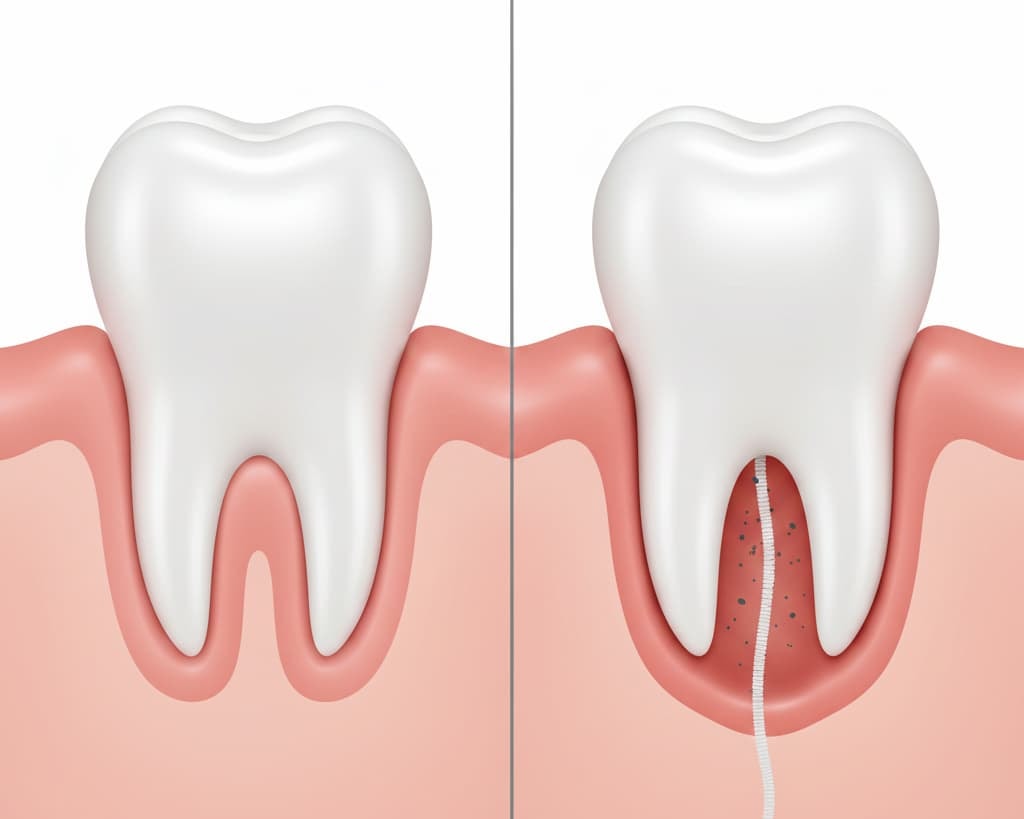
Gum disease, ranging from mild gingivitis to severe periodontitis, is a serious contributor to a foul floss odor because it creates deep bacterial reservoirs below the gum line.
When inflammation is present, the gums separate from the tooth, forming 'periodontal pockets.' These pockets are dark, moist, and low in oxygen, providing the ideal anaerobic environment for the most harmful, odor-causing bacteria to flourish and release volatile sulfur compounds (VSCs).
The depth of these pockets is a measure of the disease's progression, and the foul smell picked up by the floss as it enters these spaces is a direct indicator of active bacterial infection that requires professional periodontal treatment.
According to the Centers for Disease Control and Prevention (CDC)'s most recent 2021 data on periodontal disease, 47.2% of adults aged 30 years and older have some form of gum disease in the United States."
4. Tooth Decay and Untreated Cavities
When tooth decay or untreated cavities are present, they create hidden pockets in the oral cavity that harbor odor-causing bacteria. These areas often trap food particles, which can then decay. When you floss through these zones, you may disturb the bacteria, and you may notice a strong foul odor on the floss.
What makes tooth decay problematic is that it often starts silently. Small cavities might not hurt, but they can still collect debris and become filled with plaque and food debris, creating the perfect conditions for volatile sulfur compounds to form. If the foul odor persists even after brushing and flossing, it might be a hidden cavity that needs treatment.
Based on the Centers for Disease Control and Prevention (CDC)'s 2019 report, more than 13% of adults aged 65 and older in the United States have lost all their teeth due to decay or gum disease.
5. Reduced Saliva Flow (Dry Mouth or Xerostomia)
Dry mouth, or xerostomia, is a condition where your mouth doesn't produce enough saliva. While it may seem minor, it's a significant cause of oral health issues, including bad breath, increased bacterial buildup, and, yes, a foul odor during flossing.
Saliva plays a crucial role in maintaining a healthy oral environment. It helps wash away food debris, neutralize acids, and prevent the overgrowth of harmful bacteria. When saliva production decreases, food particles remain in the oral cavity longer, and bacteria feed on them more aggressively. This produces a buildup of sulfur compounds that cause an unpleasant smell when you floss.
Common causes of dry mouth include:
-
Dehydration
-
Certain medications (especially antihistamines, antidepressants, and blood pressure meds)
-
Aging
-
Smoking or alcohol use
6. Crowded and Misaligned Teeth
Misaligned teeth or tight spaces between them make it easier for food particles and bacteria to get stuck and more difficult to clean effectively. These cramped areas create ideal hiding spots for plaque buildup, making consistent flossing even more important and more challenging.
-
When food debris becomes trapped in these areas, it begins to decay, releasing an unpleasant odor when disturbed during flossing.
-
These tight gaps can also limit the effectiveness of traditional floss, especially if you're not using the correct flossing technique.
-
Over time, buildup in these areas can lead to gum disease, tooth decay, and eventually a foul smell from your floss.
If your floss smells bad in the same spot repeatedly, and your teeth are crowded in that area, it may indicate the need for orthodontic correction.
7. Improper Flossing Technique
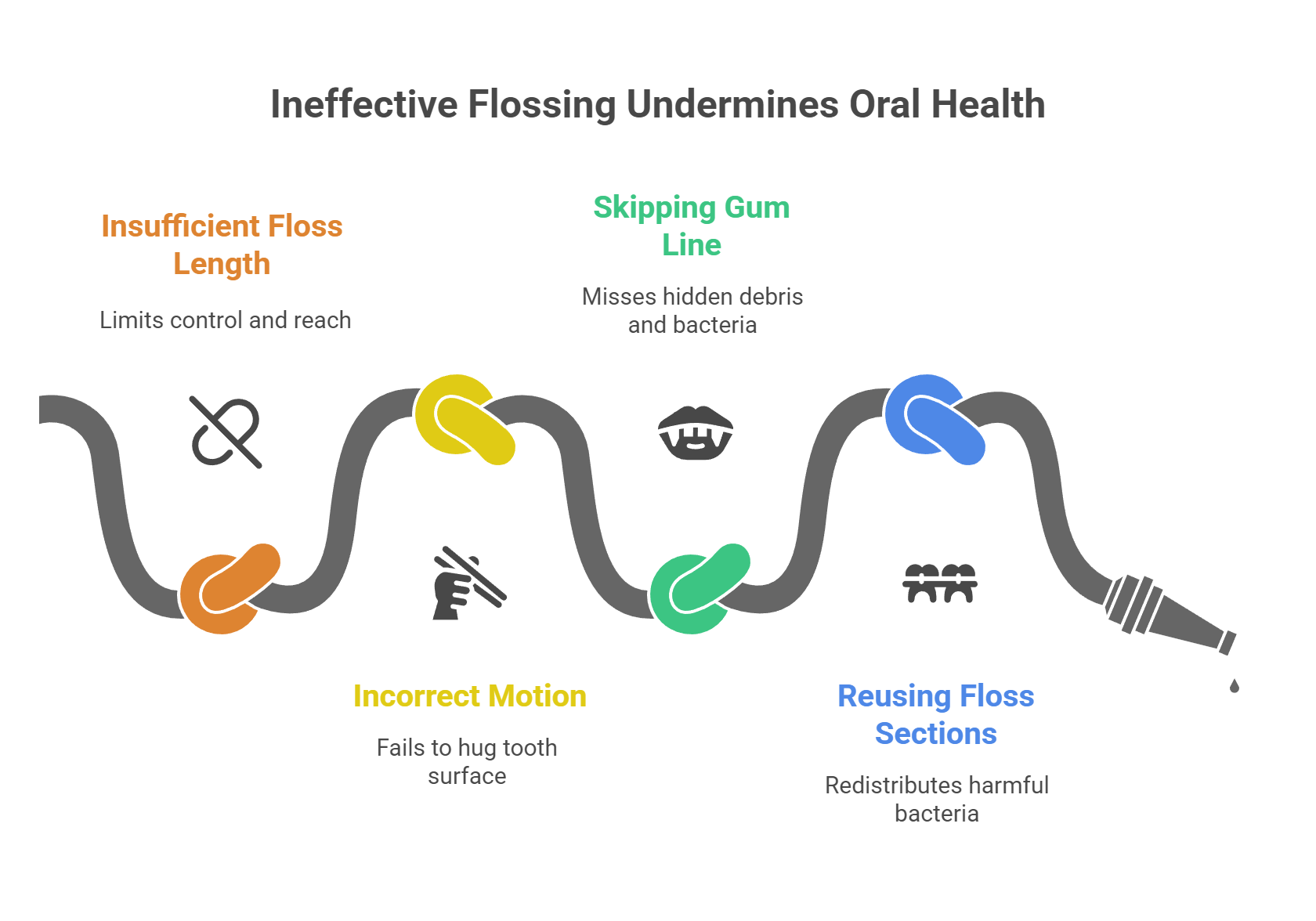
Even if you're flossing daily, improper technique or skipping areas allows bacteria and food particles to linger. This leads to the same issues seen with not flossing at all: bacterial buildup, volatile sulfur compounds, and that persistent foul smell on your dental floss.
Here’s what a proper technique looks like:
-
Use about 18 inches of floss and wrap it around your fingers to ensure control.
-
Gently glide it between your teeth using a C-shape motion to hug each tooth’s surface.
-
Go just beneath the gum line to remove debris and bacteria hiding there.
-
Always use a clean section of floss between each tooth.
Failing to reach beneath the gums or using the same dirty section of floss across multiple teeth redistributes harmful bacteria, increasing the risk of gum inflammation, oral health issues, and persistent foul odor from flossing.
8. Active Tobacco Use
Tobacco products, including cigarettes, cigars, and chewing tobacco, create a perfect storm of oral health problems. They dry out the mouth, introduce tar and chemicals that cling to teeth, and drastically alter your mouth’s microbiome, allowing odor-causing bacteria to flourish.
Here’s how tobacco use leads to a foul smell when flossing:
-
Nicotine restricts blood flow to your teeth and gums, delaying healing and reducing your ability to fight infection.
-
Smoking reduces saliva production, contributing to dry mouth and increasing bad breath.
-
Tar particles cling to your enamel, feeding plaque and intensifying foul odor.
Studies also show that tobacco users are significantly more prone to gum disease and periodontal disease, which we know produce potent sulfur compounds during flossing.
9. Poorly Fitting Dental Work or Orthodontic Appliances
If you have crowns, bridges, braces, or retainers that don’t fit well, they can trap bacteria, food debris, and plaque in areas that are nearly impossible to clean. When these hidden deposits accumulate, they become breeding grounds for odor-causing bacteria, leading to a persistent foul odor whenever you floss nearby.
Poorly fitting dental devices create specific traps for debris and bacteria:
-
Crowns and Bridges: The margins can allow food to sneak underneath, leading to decay and localized odor.
-
Braces: Orthodontic brackets create multiple tight spaces that easily catch and hold food particles.
-
Retainers and Mouthguards: If not sanitized daily, these appliances can reintroduce harmful bacteria back into the mouth.
These devices should be examined regularly by your dentist or orthodontist. If you wear a retainer or mouthguard, make sure to sanitize it daily with an appropriate cleanser.
10. Systemic Medical Conditions
In rare cases, a persistent foul odor from flossing may be linked to deeper oral health issues or even systemic conditions.
These may include:
-
Advanced periodontal disease, where gum pockets are filled with bacteria and dead tissue
-
Untreated cavities in inaccessible areas
-
Oral infections, such as abscesses, that release pus or foul gases
-
Underlying medical problems like GERD, diabetes, or sinus infections that affect breath freshness
When a bad smell lingers despite good oral hygiene, professional help is critical. A professional cleaning can remove hidden tartar buildup, while an evaluation can determine if more serious conditions are at play.
In the U.S., over 3.5 billion people are affected globally by oral diseases, and nearly half of adults over 30 experience conditions like gum disease or tooth decay that contribute to these issues. This is why it's essential to see a dentist regularly, especially when symptoms like odor signal something more profound.
How Can Proper Flossing Technique Prevent Bad Odors?
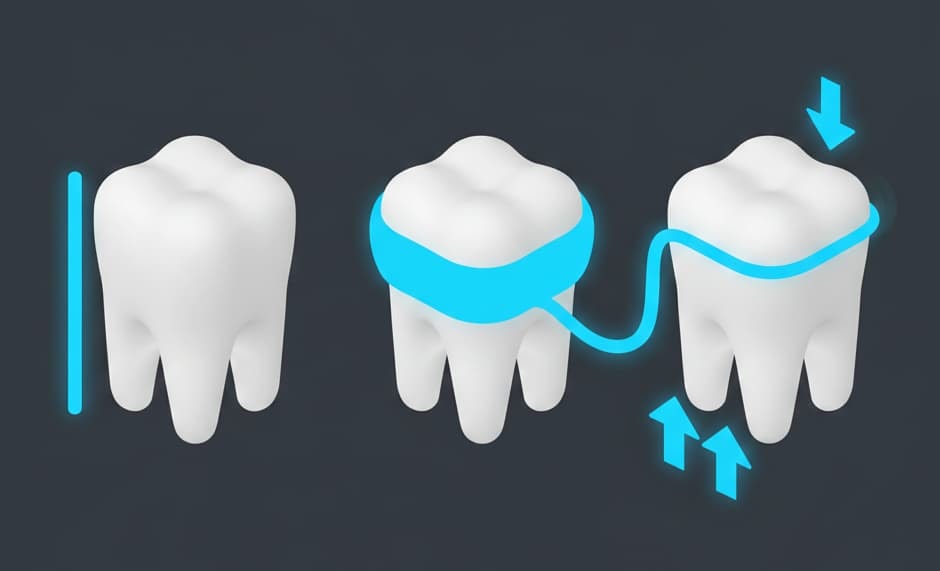
Proper flossing technique prevents bad odors by ensuring the complete physical removal of odor-causing food debris and bacterial plaque from the interproximal spaces.
By using a clean 18-inch section of floss and wrapping it into a tight 'C-shape' around each tooth, you can effectively scrape both the tooth surface and gently slip beneath the gum line. This action physically dislodges the anaerobic bacteria and VSC-producing material that traditional brushing cannot reach.
Consistent, correct flossing essentially eliminates the source material for the foul smell, resetting the balance of the oral microbiome in the tightest areas of the mouth.
For individuals with crowded teeth, braces, or limited dexterity, alternative tools like interdental brushes or water flossers are critical for eliminating deep-seated odor sources.
Water flossers, for example, use targeted, pressurized water to flush out food particles, loose debris, and bacteria from deep between teeth and periodontal pockets without the risk of irritating or cutting the gums.
These tools are invaluable because they provide effective cleaning in areas where traditional floss is challenging to maneuver, ensuring that even the most difficult-to-reach odor-causing debris is removed.
What Other Oral Hygiene Practices Help Eliminate Foul Odor?
Beyond proper flossing, a comprehensive oral hygiene routine helps prevent bad breath and maintain a healthy mouth. Brushing twice daily removes bacteria and prevents unpleasant odors. Cleaning your tongue eliminates bacterial buildup, a major contributor to bad breath.
Antibacterial mouthwash neutralizes odors and reduces bacteria in the mouth. Professional cleanings remove tartar that standard flossing or brushing can’t address. Tools like interdental brushes and an electric toothbrush reach hard-to-clean areas, ensuring thorough professional cleaning and oral hygiene.
Incorporating these practices into your daily routine helps keep your smile healthier and keeps foul odors at bay. Regular dental health visits to the dentist regularly catch potential issues early, and you can also schedule an appointment to keep your mouth in top condition.
When Should I See a Dentist About Floss Odor?
Even if you brush and floss daily, persistent odor is not something to ignore. If you notice a mild odor or a strong, foul smell on your floss that doesn’t go away, it could be a warning sign of an underlying problem, such as untreated cavities, gum disease, or even a hidden infection.
You should schedule an appointment with your dentist if you experience:
-
Persistent bad breath despite good hygiene
-
Bleeding gums during or after flossing
-
Gum swelling or tenderness
-
Tooth sensitivity or pain
-
Signs of tooth loss or loose teeth
These symptoms may indicate advanced oral health issues, such as periodontal disease or bacteria-filled gum pockets. Only a professional cleaning can address tartar buildup that brushing or flossing alone won’t resolve.
Also, if you’ve recently had dental work like crowns or implants and notice bad smells during flossing, it could signal a poor fit or trapped debris. A dental visit ensures everything is functioning correctly and helps preserve both your teeth and gums.
Final Thoughts
Understanding why your floss smells bad is more than just a matter of fresh breath, it's a window into your overall oral health. Common culprits like trapped food particles, bacterial buildup, gum disease, tooth decay, and dry mouth can all produce that unpleasant odor and signal deeper dental concerns.
Building a consistent oral hygiene routine, including flossing regularly, brushing with a soft-bristle toothbrush, using antibacterial mouthwash, and keeping up with dental checkups, can help you eliminate odors and keep your oral cavity clean.
Tools matter too. SNOW’s Water Flosser makes it easier to clean hard-to-reach areas and flush out odor-causing debris for a healthier smile.
Try the SNOW Water Flosser Today!
Frequently Asked Questions
Quick answers to common questions about floss odor, oral hygiene, and when to see a dentist.
What should you do if the smell persists despite good oral hygiene?
If the smell persists despite good oral hygiene, it is essential to consult your dentist, especially if you experience bleeding gums. This could indicate an underlying issue that needs professional attention.
What role does saliva play in oral health?
Saliva plays a crucial role in oral health by washing away food particles, neutralizing acids, and controlling bacteria. A deficiency in saliva can result in increased odor and potential dental issues.
What is a recommended solution to prevent bad smell when flossing?
To prevent bad smell when flossing, it is recommended to floss daily to remove trapped food and use an antibacterial mouthwash. This routine helps maintain effective oral hygiene.
When should you see a dentist regarding floss odor?
You should see a dentist if you experience a persistent foul odor while flossing, especially if bleeding or swollen gums accompany it. Addressing these symptoms promptly can prevent further dental issues.
What causes an unpleasant odor on dental floss?
An unpleasant odor on dental floss is typically due to trapped food particles, bacteria, and plaque buildup, as well as the presence of volatile sulfur compounds or potential gum disease. Regular flossing and good oral hygiene can help prevent this issue.















































